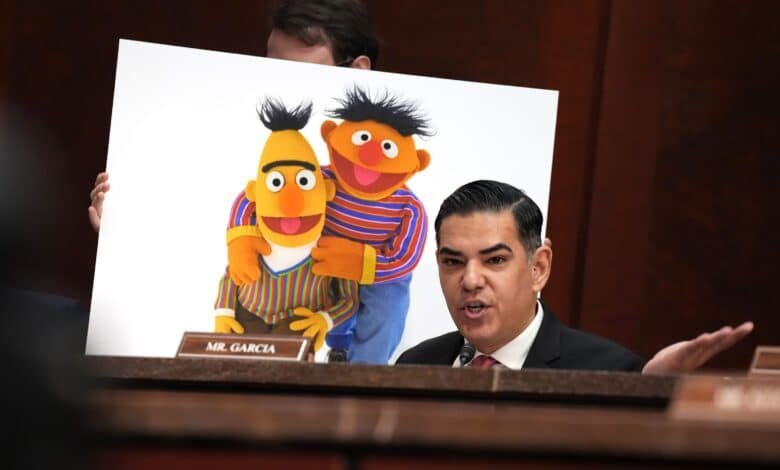The Republicans accuse NPR, PBS of bias at the hearing of the house; Democrats reprimand him as a partisan attack

The Republicans accused the public media NPR and PBS of bias during a subcommittee audience of the Chamber on Wednesday, while the Democrats defended the organizations and criticized the event as a distraction of the in progress controversy concerning the use by the Trump administration of the signal messaging application for the communication of sensitive information.
During the hearing, the Republicans called at the end of the media funded by taxpayers when they accused the media of promoting an “awakened ideology” for a younger audience while the Democrats sought to have fun at the audience by questioning the witnesses on the subtleties of the ELMO and the Cookie Monster as they accused the Republicans of the Loss of Time.
The president and chief executive officer of PBS, Paula Kerger, and the president and chief executive officer of NPR, Katherine Maher, refuted allegations of prejudices, claiming that the media respect journalistic standards and serve a diversified audience which includes rural viewers.

The American representative Robert Garcia (D-CA) speaks before the poster of Bert and Ernie of Sesame Street at a hearing of the Surveillance Committee of the Chamber and the Reform of the Government in the American Capitol on March 26, 2025 in Washington, DC.
Andrew Harnik / Getty images
“I hear, respect and understand your concerns about biases and if public media are relevant in a commercial landscape,” said Maher. “It is essential for the NPR editorial room to operate with the highest journalistic standards. This means that they do their work independently, and as CEO, I have no editorial role in NPR. ”
A few minutes later, Kerger added: “PBS stations are focused on the needs and interests of viewers they serve. In particular in rural areas, PBS stations are the only points of sale offering coverage for local events, for example secondary school, local history and culture, candidates for all levels of the electoral bulletin and new specialized agricultural.”
The hearing, entitled “American anti-American: holding the NPR and PBS head”, was owned by the government’s efficiency subcommittee (DOGE), whose name echoes the government’s efficiency department, the Trump administration reduction initiative supervised by Elon Musque.
The representative Marjorie Taylor Greene, R-GA., Criticized NPR and PBS at the hearing for what she called on liberal bias, indicating federal financing of the outlets as a target of potential cuts.
“NPR and PBS are more and more radical and left -wing echo rooms for a narrow audience of liberals and urban progressives, mainly rich, white,” said Greene.
Representative Stephen Lynch, D-MASS., Defended the public media and criticized the hearing as a distraction for more important questions often addressed by the Chamber’s surveillance committee, the larger organization to which the DOGE sub-comity belongs.
“I am sad to see this formerly proud committee – the main investigation committee in the House of Representatives – has now looked at the lowest levels of partisanry and political theater to hold an audience to go after Elmo and Cookie Monster and Arthur The Aardvark,” said Lynch.

The representative president of the Marjorie Taylor Greene Committee, Republican of Georgia, examines during a house surveillance audience and government reform on public broadcasting services on Capitol Hill on March 26, 2025 in Washington, DC.
Drew Angerer / AFP via Getty Images
Later in the hearing, representative Robert Garcia, D-Calif., Sacastically said: “Is Elmo now, or has he already been, a member of the Communist Party?”
Another Democratic legislator, representative Greg Casar, of Texas, said: “Leave Elmo quiet, leads Elon to question in place”, referring to the billionaire Elon Musk, who is the public face of the Department of Efficiency of the Government of the Trump Administration.
Representative James Comer, R-Ky., Brutally criticized the previous NPR coverage of the origins of Covid-19 and an investigation into the Biden family, which Commer conducted.
“I think you abused the privilege you had with the reception of federal funds,” said Commer, seated before signs making the headlines with which he said he had disputed.
In response, Maher, of NPR, said: “I want to recognize your concerns”, noting that she has taken measures to “strengthen our editorial standards” after taking her position last year.

The president and chief executive officer of the public broadcasting service, Paula Kerger, testifies during a hearing of the surveillance and reform committee of the government of the Chamber in the American Capitol on March 26, 2025 in Washington, DC.
Andrew Harnik / Getty images
“Why does NPR even make editorials?” Commer replied, exasperated and apparently confused as to what “editorial standards” meant. “Do you even need opinion – if you are an entity funded by the federal government which is supposed to provide the news?”
“I mean, the editorial standards of our journalism … bringing more editors to ensure that we have more points of view reflected in each story. I have embarked on a certain number of actions,” she said before Commer cut it.
“I lost confidence in public radio,” he said.
While the media leaders defended their editorial standards, Maher recognized that the treatment of stations in the history of Hunter Biden Liptop was “an error”.
“I mean that NPR recognizes that we were wrong and that we did not cover the history of the Hunter Biden Laptop more aggressively and earlier,” said Maher.





